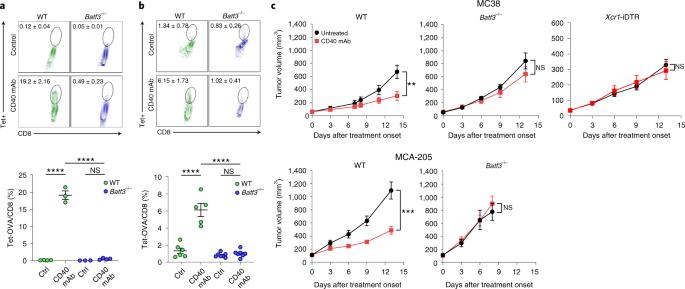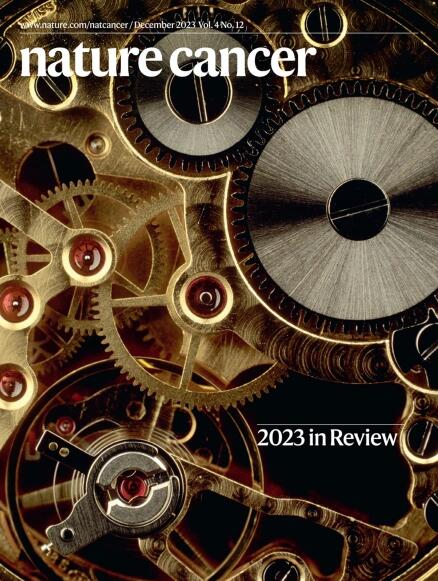Bispecific antibodies increase the therapeutic window of CD40 agonists through selective dendritic cell targeting
IF 28.5
1区 医学
Q1 ONCOLOGY
引用次数: 16
Abstract
Therapeutic use of agonistic anti-CD40 antibodies is a potentially powerful approach for activation of the immune response to eradicate tumors. However, the translation of this approach to clinical practice has been substantially restricted due to the severe dose-limiting toxicities observed in multiple clinical trials. Here, we demonstrate that conventional type 1 dendritic cells are essential for triggering antitumor immunity but not the toxicity of CD40 agonists, while macrophages, platelets and monocytes lead to toxic events. Therefore, we designed bispecific antibodies that target CD40 activation preferentially to dendritic cells, by coupling the CD40 agonist arm with CD11c-, DEC-205- or CLEC9A-targeting arms. These bispecific reagents demonstrate a superior safety profile compared to their parental CD40 monospecific antibody while triggering potent antitumor activity. We suggest such cell-selective bispecific agonistic antibodies as a drug platform to bypass the dose-limiting toxicities of anti-CD40, and of additional types of agonistic antibodies used for cancer immunotherapy. Dahan and colleagues develop bispecific antibodies to overcome toxicities associated with CD40 agonists by preferentially targeting CD40 activation to dendritic cells, demonstrating effective antitumor immunity in multiple murine solid tumor models.

双特异性抗体通过选择性树突状细胞靶向增加了 CD40 激动剂的治疗窗口期
治疗性使用激动剂抗 CD40 抗体是激活免疫反应以根除肿瘤的一种潜在强效方法。然而,由于在多项临床试验中观察到的严重剂量限制性毒性,这种方法在临床实践中的应用受到了很大限制。在这里,我们证明了传统的 1 型树突状细胞对于触发抗肿瘤免疫至关重要,但 CD40 激动剂的毒性并不存在,而巨噬细胞、血小板和单核细胞则会导致毒性事件。因此,我们设计了双特异性抗体,通过将 CD40 激动剂臂与 CD11c、DEC-205 或 CLEC9A 靶向臂耦合,优先靶向树突状细胞激活 CD40。与亲代 CD40 单特异性抗体相比,这些双特异性试剂具有更高的安全性,同时还能激发强大的抗肿瘤活性。我们建议将这种细胞选择性双特异性激动抗体作为一种药物平台,以绕过抗 CD40 以及其他用于癌症免疫疗法的激动抗体的剂量限制毒性。Dahan 及其同事开发了双特异性抗体,通过优先靶向树突状细胞激活 CD40 来克服 CD40 激动剂的毒性,在多种小鼠实体瘤模型中证明了有效的抗肿瘤免疫。
本文章由计算机程序翻译,如有差异,请以英文原文为准。
求助全文
约1分钟内获得全文
求助全文
来源期刊

Nature cancer
Medicine-Oncology
CiteScore
31.10
自引率
1.80%
发文量
129
期刊介绍:
Cancer is a devastating disease responsible for millions of deaths worldwide. However, many of these deaths could be prevented with improved prevention and treatment strategies. To achieve this, it is crucial to focus on accurate diagnosis, effective treatment methods, and understanding the socioeconomic factors that influence cancer rates.
Nature Cancer aims to serve as a unique platform for sharing the latest advancements in cancer research across various scientific fields, encompassing life sciences, physical sciences, applied sciences, and social sciences. The journal is particularly interested in fundamental research that enhances our understanding of tumor development and progression, as well as research that translates this knowledge into clinical applications through innovative diagnostic and therapeutic approaches. Additionally, Nature Cancer welcomes clinical studies that inform cancer diagnosis, treatment, and prevention, along with contributions exploring the societal impact of cancer on a global scale.
In addition to publishing original research, Nature Cancer will feature Comments, Reviews, News & Views, Features, and Correspondence that hold significant value for the diverse field of cancer research.
 求助内容:
求助内容: 应助结果提醒方式:
应助结果提醒方式:


